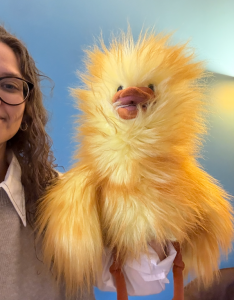By Alexis Wood, MA, LAMFT

Millions of people all over the world have been enamored with shows like the Muppets and Sesame Street. These shows have captivated young and old since the late ’60s and early ’70s. When engaging with puppets, there is a vulnerability needed from adults in the room. It can feel clunky or weird to talk to a puppet because we (adults and kids, depending on age) know that you’re really talking to the person controlling the puppet. And yet, when we are able to suspend reality and engage in the playfulness of the puppet, it taps into our imaginations and can open up conversation, play, and learning, providing an opportunity to meet children where they are developmentally.
In previous blog posts, I’ve written about the power of play with children and its critical role in helping children learn (feel free to go back and read that article from May 2024). Children’s brains are wired up through play (Haidt, 2024). Puppets are an excellent clinical tool to meet children in play and allow them to learn through play as they engage with puppets.
The yellow bird pictured above is my good pal and puppet friend, Stevie. When working with children, I consider this puppet one of my “co-therapists.” The use of puppets in therapy is not a new concept. In fact, puppets have been used to tell stories and teach lessons to people young and old for centuries around the world. I utilize Stevie and many other characters as clinical tools. Puppets are used in therapy for the emotional expression and externalization of complex emotions and experiences that might be too difficult to articulate verbally. Sometimes, it’s easier to say it to or through a puppet than it is to tell an adult.
In addition, puppets can be a great tool when working with children on social skills. They enhance communication and social skills by providing structured opportunities to “practice” these skills. Children can practice by interacting with the puppets themselves or using puppets to interact with others. Interacting with puppets can help children and individuals develop empathy and explore different perspectives, which are essential skills for social and emotional growth.
Lastly, I use Stevie to express confusion. Confusion can be an incredible clinical tool to gather information from children and give them an opportunity to explain things to Stevie. This can give me, as a clinician, feedback on where a child is in understanding something. Additionally, having one of my puppets be confused and ask questions models curiosity, which I believe is an important tool for children to discover and learn more about themselves and the world around them.
Resources:
- Haidt, J. (2024). The anxious generation: how the great rewiring of childhood is causing an epidemic of mental illness, Penguin Press.
- Ted Talk on Play as a part of rewiring our
